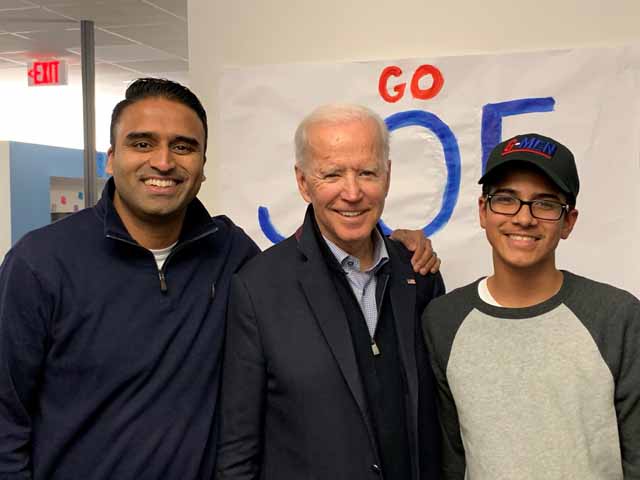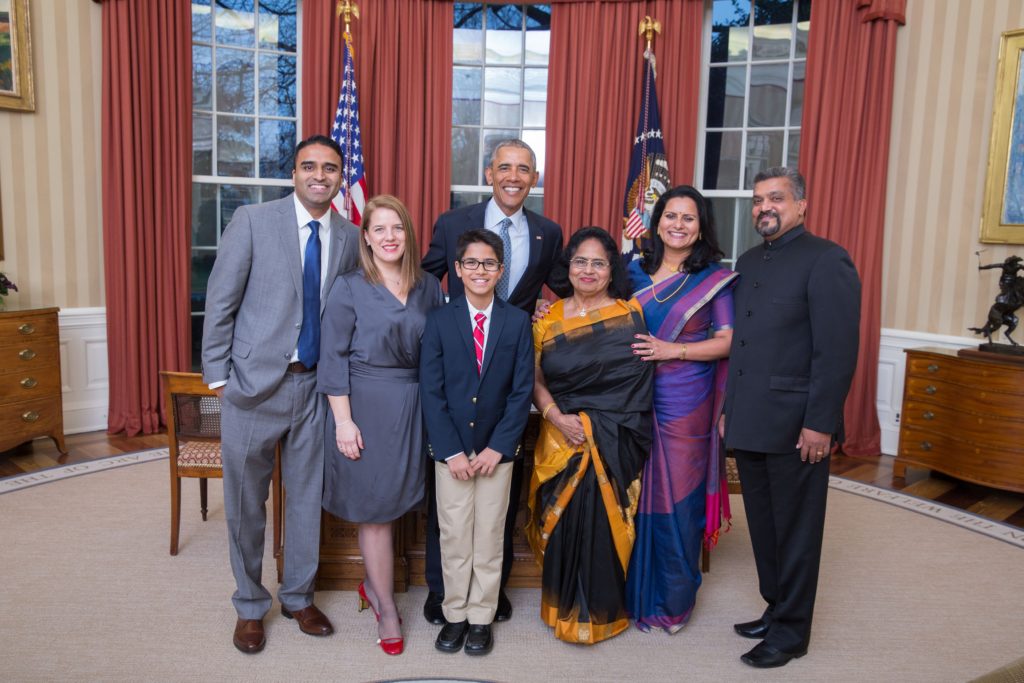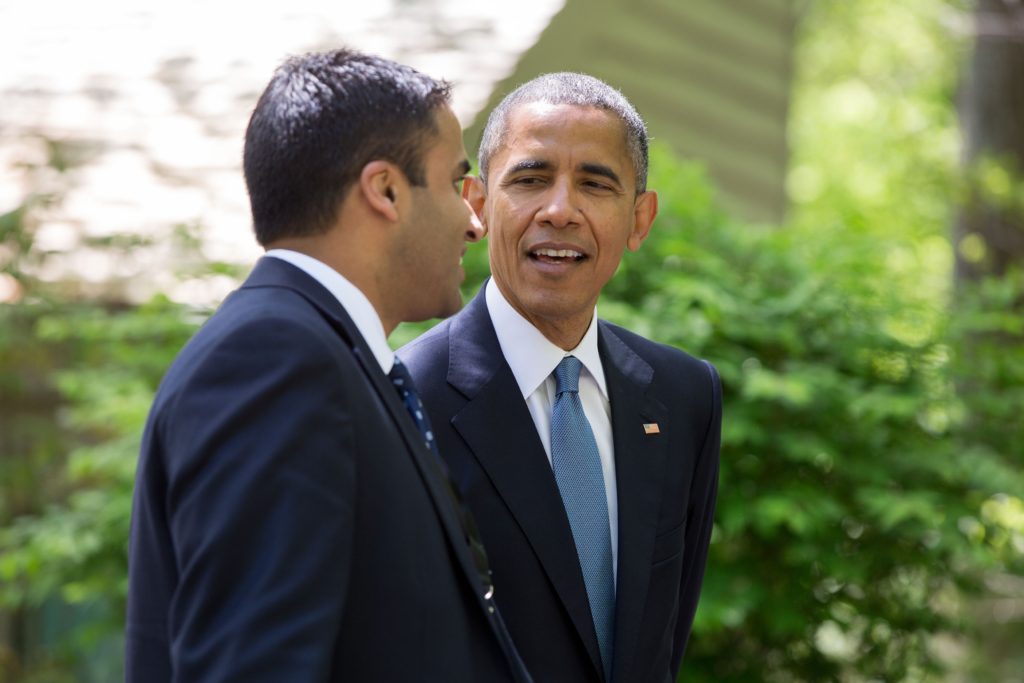11,268 people reached on Lassi with Lavina FB page – 693 engagements – Facebook Insights
70 Likes on FB
51 Likes on Instagram
428 views on LinkedIn – 15 Likes

White House Arrival Lounge!
Maju Varghese, COO of the Biden campaign and Director of the Inaugural, has just been appointed Deputy Assistant to the President and Director of the White House Military Office – I had interviewed him at the beginning of it all – read the story!
The Indian-Americans
Maju Varghese: Immigrant Tales in Joe Biden’s America
[dropcap]I[/dropcap]n America, anything and everything is possible and Maju Varghese’s story is the classic immigrant tale. His parents came to New York in the 70’s from a small town near Kochi in Kerala with little money and big dreams. His mother Saroja Varghese, a nurse, came first to relatives and established herself. She was joined by Mathew, his father, who drove a cab and worked as a security guard.
Yet in the course of a generation their son Maju Varghese, who was born in New York, obtained a law degree and frog-leaped to the upper echelons of power in Washington DC, first as an assistant to President Obama and then as deputy director of advance at the White House, Maju Varghese, 43, is now a senior advisor and COO of Joe Biden’s presidential campaign.
He studied political science and economics at the University of Massachusetts, and his love for political life took him as National Advance staff on the Al Gore campaign and as a research associate on the Democratic National Committee. He met his wife Julie while they were both working on the Gore team, and they have a son Evan.
[dropcap]V[/dropcap]arghese went on to earn his JD from the Maurice A. Deane School of Law at Hofstra University in New York. He served in a variety of roles in the Obama administration for over six years, including Assistant to the President for Management and Security. After that he became a senior advisor to the global law firm of Dentons, and then served as the COO of The Hub Project, a DC based civic organization.
In September 2019 came the call from Vice President Joe Biden’s office and Varghese has been on the team from day 1 and is currently the COO of Biden for President overseeing all organizational details of a large and diverse team in difficult times.
As he recently tweeted: “COVID turned the world upside down. Yet this talented and creative team built a national campaign in the middle of all of it. Like the VP, who speaks of finding purpose, we found renewed purpose and we’re grateful that millions of grassroots supporters joined us
Through it all, there is a constant: @JoeBiden. He is uniquely qualified to lead us with empathy, kindness and experience, qualities that define him. Honored to be on this team. Hope I’ve delivered for them this past year and made my family proud. Let’s win this. Back to work.”
Maju Varghese shares with us his immigrant experiences and how Biden can usher in a new world of justice and equality for all Americans including the ever-burgeoning Indian-American community.

Q: How difficult was it for your family to start life here in America?
A: My father never finished college. His dad died just as he was about to start school. So, dad went back home and got a job to take care of his mom and his brother and sister. So, he didn’t get a lot of formal education. When he came here he did what he could to contribute and make ends meet. He drove a cab in New York City during the time when the city was a dangerous place at times to drive a cab. Those in the industry were unfortunately, victims, in some cases, of violent crime. My dad would drive into the night and my mom was obviously very concerned.
It’s funny – I was getting out of Washington not long ago, and I saw an Indian cab driver. When we stopped at the red light, he was eating dinner out of a Tupperware container – and I saw my father in that.
Q: How was it for you and your sister to grow up as the children of immigrants?
A: My sister Manju was six when she came into this country. It was a brand-new country for her and she didn’t speak the language that well. She says, “They made fun of me for my name, they made fun of me for my clothes. I would come home to mom and dad crying.”
They definitely had their share of struggles I think, just getting acclimated and getting settled, but they also had the gift of family and little pockets of the Malayalee community around them.
We grew up in a Christian household and Christian churches had many Malayalee families, so that was another refuge for them to build community here. Growing up, we went to church every Sunday with them. We had the vibrant Indian community on the weekends and then I had my day-to-day American life on the weekdays. I took that for granted but what a gift that was. It really shaped the way I was brought up.
Q: Did you feel like ‘The Other’ or did you feel that the American life was within your grasp?
A: My parents never set limits on me – they pushed me pretty hard to do what I wanted to do to the fullest. They never intimated to me that this country did not have a place for me. Looking back, that was a remarkable thing. I felt I was a bridge between two worlds. I had a lot of aunts, uncles and cousins, living within minutes. So we ate the food and we went to church and we watched the movies. I had a foot in each world and I was comfortable in both.
Q: Can you tell us how the immigrant experience has influenced your career and world-view?
I have been fortunate enough to do the work I’ve done and go to places I could only have dreamed of, such as a couple of trips to India for President Obama, the last of which was on Republic Day in 2015 – walking into the presidential palace in Delhi or showing up at the Republic Day Parade with the President of the United States.
In Washington my family – my parents, my sister and aunts and uncles – would visit the White House and I would show them the Rose Garden and I would think how far we had come in one generation and that this was all because of the hard work they did together.
I think the other world-view that it has shaped for me is that I’ve become very protective of all immigrants, their journey, and their story. I feel incredibly protective of their legacy. I know how good we can be as a country and strive to do it right. I know that I’m a very important link in the chain because I saw first-hand their struggle. It is very important for all of us who didn’t actually live that struggle to continue to tell their story, not just to our children but to our colleagues and our friends, make sure that that story lives on and those values live on. We give people very little space to do that and we demean or denigrate their experience.

Q: How was it working for President Obama?
It was a really remarkable run and I got to meet and work with some outstanding people who are like family to me. He’s just an incredible person and also a terrific human who has a way of connecting with everyday people which is a remarkable thing. We saw how warmly he was embraced in India.
Q: You’ve been with VP Joe Biden from day one of his presidential bid. What can you share about the ups and downs and what you’ve learnt about Biden as a person.
We had a very talented and primary field of contenders and those were tough days in February 2020 when we took on Iowa, New Hampshire and Alabama. We were much smaller and had a lot less resources. I was just really impressed with the vice president’s resilience, but also how we dealt with the pandemic. That was an education, and something I had never done before. At the end of the day they say that you get measured by the company you keep and the people you work with. At the end of the day, I’ve spent the better part of the last few years with Barack Obama and Joe Biden and I’m proud of that.
My biggest takeaway about Biden, I think is having a president with his experience and his knowledge but also his empathy. The feeling of what personal loss is, having unfortunately in his life gone through it too many times – you can’t underestimate what that means to those who are hurting right now with so many lost to COVID. I think having someone with that kind of reservoir of empathy – I can’t say enough of how important it is.
Q: You once tweeted about how Parkinson’s disease affected your dad. How important is Obamacare for America’s future and what are VP Biden’s plans to protect it?
A: It is extremely personal to me. My dad was ravaged by Parkinson’s disease, and he couldn’t walk and in the last few months of his life couldn’t even stand up on his own. We were lucky because my father had what he needed in coverage but there are so many who don’t. It’s incredibly important that we not only uphold the ACA and build on it, but that we also maintain those protections because they’re so important. I see my family in a lot of these policies and a lot of these stories..I think there’s a generation of us who grew up here with an education and experience and we need to stand up and fight for those things.
Q: How important do you think is the choice of Senator Kamala Harris to Indian-Americans?
A: It is incredibly important. After we got the news, I got emails and phone calls from families who aren’t necessarily political. They felt heard and seen in a way that maybe they hadn’t before. That photo of Senator Harris with her mom in a sari – that was all of our moms. I think it’s going to mean a lot for the Indian American experience in this country, another symbol of how far we’ve come. And this country has the place for it. Our children don’t have to become doctors and engineers, for children to serve at the highest levels of government, and it can be a vital part of our democracy, and can contribute to society in so many ways. I think you’re going to see another generation of Indian American leaders in politics and government as a result of that.
Q: There is a notable presence of Indian Americans in the Biden team. Will it have an impact on his approach to India and also immigrants from India?
A: I think the diversity of the staff is something that we’re proud of because it reflects the diversity of the country. It will have an influence on the administration because this campaign feels very much like America, with people from all walks of life. First generation Americans are people whose parents have immigrated in the last 30-40 years. I think it’s personal to us. It’s not abstract – we’ve lived it. I’m confident that if we’re fortunate enough to win we’ll have an administration that feels the same way. I think people across the country will know that their story is somehow represented in that White House and in that administration.
Q: Finally, your own son Evan is 14 years old. What do you hope for his future?
A: In terms of our children, I want a president who reflects the values that brought my parents to this country and we transcend communities and the vice president’s values at its core are family, community, faith, empathy, decency. This is how our parents raised us and that’s what sustained them through some very challenging times in this country. I want my son to grow up in a country that raises those values up again. I want my son’s legacy to reflect what my parents did to get us to where we are and uphold those values that can connect communities like the one I grew up in. They represent the best of us, and embrace the best of us, including our diversity.
(This article was first published in The Week)

1 Comment
Meeraworldart via Instagram
Wow! Loved reading about Maju’s inspiring journey. Achieving so much against all odds is a reflection of his & his family’s grit. Thank you for this interview, Lavina.